February Reviews: Love

“Love accomplishes all things. Love accomplishes all. Love accomplishes. Love." - Petrarch quoted in graffiti
"Red Hands" by Colin Sargent; Musical: "Hamilton"; Interview: Colin Sargent; Writing Tool: Clockify; Short Story: "Art Lovers"

INTRO: I am grateful to all who read these reviews, donate to Doctors Without Borders, subscribe, and make suggestions. I respond to everyone who emails me as quickly as I can. I know it has been a tough few months for many of my friends. There have been heartbreaking losses. It can be a battle some days to take one more step.
On this site, I only review work that I love and hope you feel that love coming through. Thanks to those near, especially my family for their patience and support, and to all those friends far away. Stay strong, take care of yourself, and take one more step forward. It's corny to say out loud, but we need each other. We are in this together.
BOOK REVIEW
"RED HANDS" by Colin W. Sargent
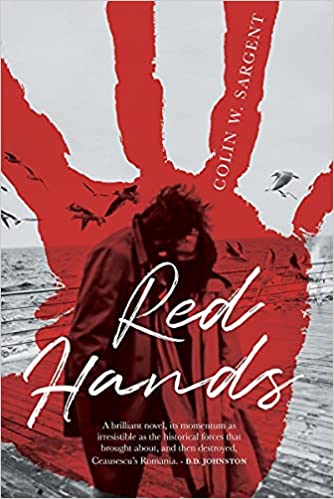
Because Red Hands will be released in the United States this Valentine's Day, 2023, and because I managed to get the busy Colin W. Sargent to agree to an interview for my February Reviews, I am repeating this short review of Red Hands I wrote nearly a year ago.
Red Hands is Colin W. Sargent's masterwork. I was hooked by the second chapter and carried it around with me for two days grabbing every spare minute to finish it. Though it is based on 800 hours of factual interviews, it reads like a romance, then a thriller, and then became for me a powerful emotional experience. This novel deserves all the accolades it has received.
London's Morning Star named the book one of the top six books in the United Kingdom the year it was released in England.
Here is the summary of the book from Sargent's website: "Red Hands is a deeply compelling tale of a woman caught inside the destruction of a regime. Iordana is a normal girl, brought up with all the perks of Romania’s corrupt communist regime. Then she falls in love and marries the eldest son of her parents’ arch-rival, Romania’s monstrous dictator Nicolae Ceausescu. They become the in-laws from hell, but she brings them their only grandson. And then there’s the 1989 revolution when crowds will kill anyone with the Ceausescu name. In all the blood and chaos, can Iordana keep her little son alive?"
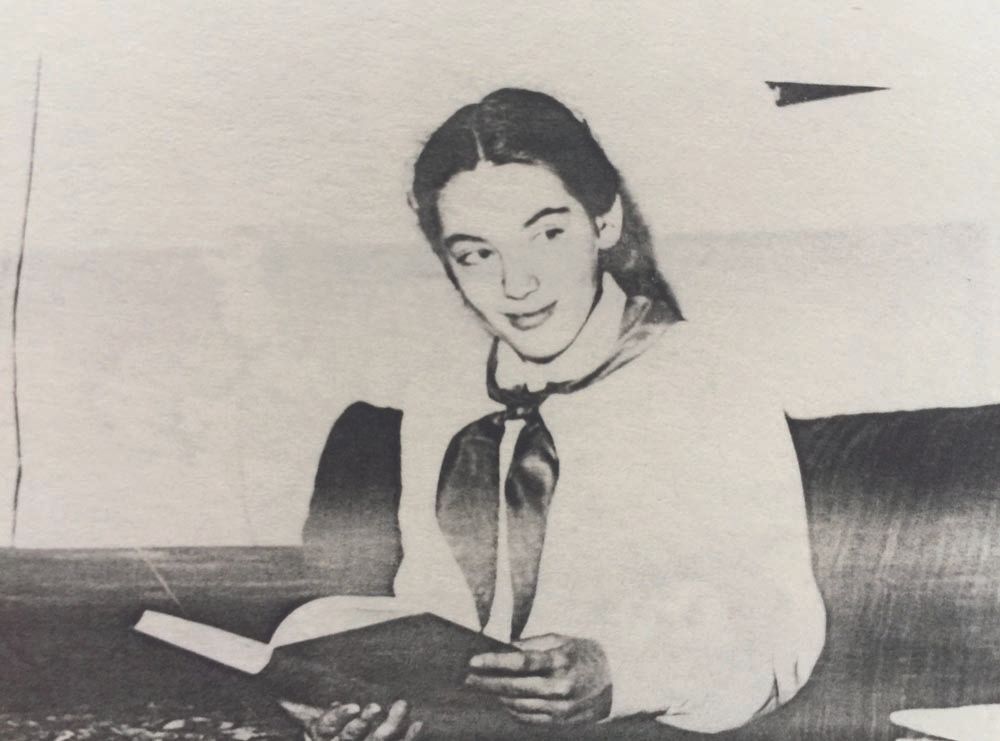
Sargent's first published books were collections of poetry: Luftwaffe Snowshoes, Blush, and Undertow. I own all three of those books and I have gone back to his mysterious and always fascinating poetry many times. His first novel Museum of Human Beings is included in the National American Indian Heritage Month Booklist and describes the life of Jean-Baptiste Charbonneau, the son of Sacagawea. His second novel, The Boston Castrato, was published in 2016 and was also critically acclaimed.
Why do I call Red Hands his masterpiece? Because it has all the best elements of Sargent's unique talents and his personal concerns, or you might say his personal demons. Because it is poetic in its descriptions and perfect in the dialogue. Because it reads so deceptively smoothly you don't even know he has you by the heart until it is too late.
Highly recommended. It is available presently in the USA on Amazon as a paperback. It will be released in the United States on Valentine's Day, 2023.
MUSICAL: HAMILTON
It's not that I am late to the party, It's just that it wasn't until the musical Hamilton was available on Disney Plus that I could afford to see it in full. Even when there were touring companies on the road, as there are now on the east coast and in the south, tickets remained expensive, if you could get them at all.
The television production of Hamilton changed that. But it was clear that the multi-camera TV production, with the drone-like angles of what theater directors used to call "evidence tapes" (a term that can be accurate as hell for those involved in a live production because this kind of drama-killing videography can feel like a crime) was not the best way to experience Hamilton. After the TV release, ticket prices became more affordable.
Fortunately, the stars aligned and I was fortunate to see the musical with family in New York City this month and nothing I could write here would do it justice. Everyone involved in the creation of this show was struck by lightning. It's magnificient.
Touring dates are available on the Hamilton website. The touring companies seem to work regionally, and as I noted earlier they are touring the east coast and the south right now. There are indications there will be west coast tours this fall. I wanted to include a few more videos of Hamilton performances, but they lock up as soon as I load them.
There are clips available on multiple streaming sites. The Kennedy Center tribute brings together the original creators and it is instructive to see them working together. Go see it when you can. You will not be disappointed.
Interview: Colin Sargent

"Readers crave an out-of-body experience."
I am honored that Colin W. Sargent agreed to an interview. As I noted earlier in these February reviews, the release date for his latest novel Red Hands Valentine's Day, 2023.
Sargent is the founding editor and publisher of award-winning Portland Magazine. He teaches Creative Writing at William & Mary in Williamsburg and is the author of the novels Museum of Human Beings, The Boston Castrato, and Red Hands. He has a Stonecoast MFA, a Ph.D. in creative writing from Lancaster University in the UK, and has written three collections of poetry. He edited Approach Magazine, the US Navy's international flying magazine, whose contributors included Tom Wolfe.



Dan: Your first three books were poetry collections. Luftwaffe Snowshoes and Blush were powerful collections. And your third, Undertow, remains one of my favorite poetry books. How did you evolve from a poet into a novelist? What helped you make that leap?
... images that jump the wall.
Colin: They’re the same thing to me. But they aren’t to everybody. I once asked poet Heather McHugh for a short story for Portland Monthly (we’re really proud of our fiction section, which has featured authors such as Rick Moody and Christina Baker Kline), but she said, “For me, writing a short story would be like walking through a swamp in high heels.” It was arresting, but when I thought about it, her answer was fiction-appropriate. It was a deductive image, sharpening and clarifying. What I love about poetry is inductive images that jump the wall.

Dan: You and your wife founded Portland Monthly magazine in your Maine
hometown in 1985. By my account, this year you will have in total published approximately 444 short fiction pieces--a strong record of support for writers. Your annual art issue has always been influential and has helped many visual artists. How do you keep up a writing schedule and still put out a monthly magazine?
... never going to die
Colin: At the senior graduation ceremony at Deering High School, Class of 1973, I asked a friend sitting beside me where he was going next. He said, “Out of here! The tallest skyscraper on the Portland peninsula is Maine Medical Center, where we’re all going to die.” Portland Monthly offers a counter narrative. We’re never going to die. I write strictly creative fiction from 7 to 8 every morning.

Dan: Your first novel, Museum of Human Beings, amazed me. Jean-Baptiste Charbonneau, the son of Sacagawea--the Indigenous woman who assisted the Lewis and Clark expedition, struggles throughout the novel as he matures to establish his identity in a new world that does not accept him. He is a true outsider. Why did this historic character and his dilemma speak to you as a writer?
... giving up our heroes
Colin: As a Mainer, I myself have always felt like an observer, on the outside looking in. A “year-round summer person,” I guess. But Maine will always be home. Writing this book taught me that we all have a hard time giving up our heroes and seeing them as living, breathing human beings competing with us for oxygen. The expedition papoose did have adulthood. I was floored when I learned that he went to Europe and played piano for Beethoven. He wasn’t always an infant--he was a child star trapped in a legend.
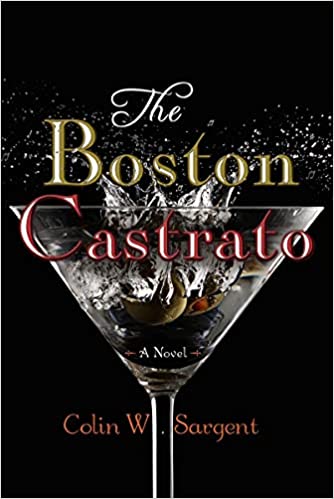
Dan: Your second novel The Boston Castrato was nominated for the Man Booker Prize by Barbican Press of London and nominated for the 2017 Fiction Price by the Virginia Library Association. The opening of that novel is almost an impressionistic dream. You strongly signal to the reader they are in for a cinematic ride. The style matched the story for me. How did you find your voice for this novel?
... a loss so unimaginable
Colin: Barbican Press, the British publisher of The Boston Castrato, specializes in “writing from the discomfort zone.” Since castration is pretty much universally known as a conversation stopper, I challenged myself to see if I could make it a conversation starter. I set out to create a character who’d suffered a loss so unimaginable that he could only feel it and understand its impact across time. It represents the loss of something that we generally think is so essential to who we are and yet isn’t the defining, or even the most important, part of who we are. One Manhattan bookstore, after first accepting, declined to host a reading of The Boston Castrato after the owner learned I hadn’t been actually physically
castrated. Yet, all humans experience a sense of inadequacy. The real question is, how do we carry on?

Dan: In an earlier conversation, I told you I consider your third novel Red Hands a masterpiece. Others seem to agree with me. London's "Morning Star" named it one of the top books in the UK. You interviewed Iordana, your heroine, the woman who fled Romania with her son, the grandson of the murderous dictator Nicolae Ceausescu, for hundreds of hours. It could have easily been a nonfiction book. I love how it starts off as a romance, becomes a thriller, and then becomes a realistic drama involving you, Iordana, and her son. How long did it take you to shape the nonfiction material into a novel?
... I promised to keep her secret
Colin: One of the things I enjoy most about Portland Monthly is all the fascinating people I’ve been honored to interview. Red Hands started as a series of conversations with a ferociously reticent and traumatized subject hiding among us in Maine who bore a background so different from my experiences. Iordana Ceausescu came to us from an extremely rarefied socioeconomic group benefitting from membership in Romania’s circle of the highest horrific power, and from a geography so physically and politically and historically different from mine. She was of a different sex, a different age, a different sense of decorum who spoke a different language. As our talks flowed, I came to realize how much a middle-income Mayflower descendant could have in common with a wealthy, glamorous member of the Soviet Bloc’s Nomenklatura. We both had a single son, a love for the ocean, shared a dark sense of humor and a yearning for a world not ruled by fear. “Dana” found herself caught up in a series of unfolding events that I came to understand were actually ones that all of us could potentially be sucked into through the natural tendency of all of us to “look away” while living our lives.
I’d read her passages that I’d worked on, fleshing out the mysteries of what she was trying to express, and I knew I’d gotten it right when she said, “How could you know?” As the scrutiny in the US began to turn on immigration policies and the question of who did and who didn’t have a right to be here grew large and ugly, Iordana developed a fear of being deported. And being shamed. How was she going to be able to protect her son? How could she ever explain herself and her own actions? To quell her terror I promised to keep her secret: that here in Maine, incognito, was the ”Dracu grandson” playing on the Old Orchard Beach basketball team. I put the conversations away until I learned of her passing and realized that she deserved for her story to be told. Looking back through my notes I saw the patterns of her life were actually the principles of a novel. There really is no fact or fiction, only storytelling delivery systems.

Dan: What suggestions do you have for new writers? What would you have done differently?
Readers want to be astonished.
Colin: Growth for me is developing my negative capability––for me the sense of traveling out of my POV and into the POV of someone entirely different. Readers want to be astonished. When people say, this story isn’t going anywhere, they really mean, this story isn’t taking me anywhere. Readers crave an out-of-body experience.
Dan: I think 2023 will be a great year for you. Thanks for taking the time to talk with me.
Colin W. Sargent's books are available on order from your local bookstore and on most online bookselling platforms.
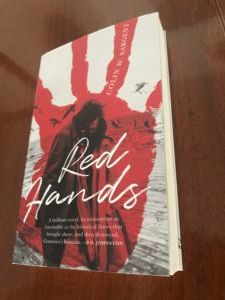
WRITING TOOLS: CLOCKIFY
There are two related self-deceptions that can eat away at the success of anyone in any field that requires daily self-discipline.
1.) Distractions related to your work eat away at your productive time, but you can't see them. You believe you had a productive day.
2.) You complete a fair day of work and erroneously believe you accomplished nothing.
I have been struggling with these two slippery perceptions for my entire life, and I have tried hundreds of different ways to keep an accurate accounting of my time at work.
Clockify has made this much easier, and unlike other timekeeping methods I have tried, the time-tracking component of this application is easy to use with an intuitive interface.
I do not recommend diving deep into this application unless you are working with a team or using it to generate billing for clients, which it can do.
I recommend learning the simple time-tracking tool and using it every day.
I have been using Clockify for three months now and I can tell you that the distractions that haunt me are very clear now. I can better avoid them.
And my work day at the desk is accurately measured and guess what, some days I am damn good at staying on track even when I thought I was fading away. I can see it there in black and white, and it feels good.
I am getting more work done with less stress and with less self-deception. Clockify provides a simple way to stay aware and awareness is everything.
The application is free and extremely easy to use. Search Clockify and click on their home website. Avoid ads for their competitors. I looked at all of them so you don't have to.
SHORT STORY: ART LOVER
(I wrote this after watching the classic film "One Two Three" written by I. A. L. Diamond, Ferenc Molnar, and Billy Wilder and directed by Billy Wilder. It is a film that, as star Cagney said, "does 60 mph on the curves." I wanted to see if I could use dialogue alone to carry a short story. A shorter version of this story appeared in Portland Monthly. One of my editors suggested that I do a series of novels featuring these two characters in the spirit of Donald Westlake's comedic caper novels. Still thinking about that.)
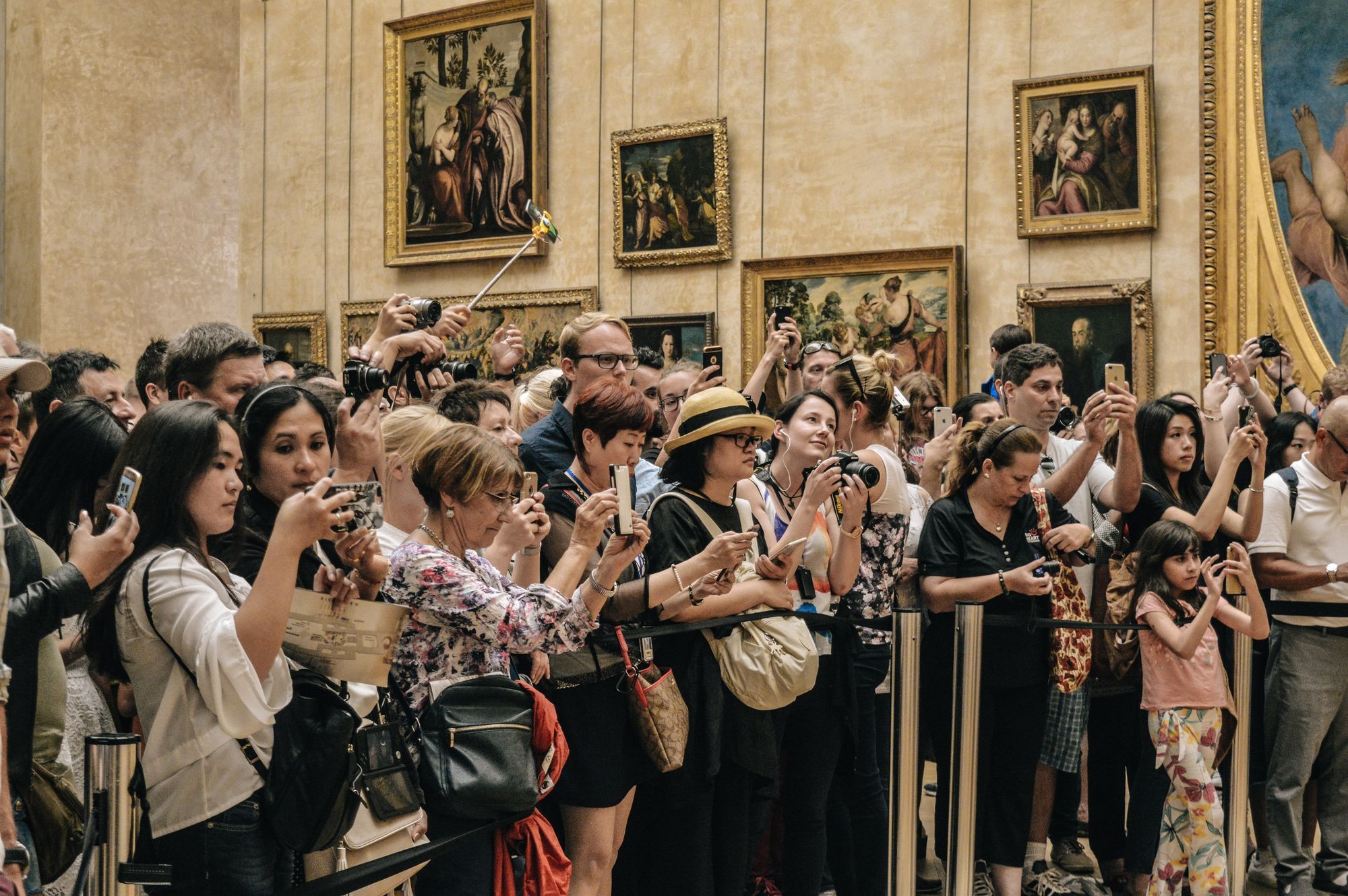
“I like the new scarf, Adie. Those colors make your eyes look huge.”
“I'm a Keane now. I need a puppy in my arms to make my portrait complete. What’re you doing standing in my office, Leary? No deals here, we don't sell paintings out the back door.”
“No, you sell lighthouse posters and key-chain souvenirs and painted bird houses out of your gift shop. Come on, Adie, it’s killing you working in a museum answering to the director and trustees. You’re better than this. You’re an artist.”
“I quit painting. I told you. Why aren’t you out flipping a questionable Monet or selling a forged Cole out of the back of your car? You have to go. I meet with the Director in five minutes.”
“I have a simple proposal.”
“You can’t stop hustling. That’s why you and I never should have …”
“This is bigger than us.”
“There is no ‘us.’ It was the wine and I was tired. Not that it wasn't distracting. There were moments, I'll give you that, but now we're back to being friends, or acquaintances, whatever we are."
“This is about business, a partnership. Listen carefully. You know Philip Mussy had a stroke?”
“Mussy’s been dead nine months. The Met has a retrospective scheduled for next year. Little late with the stroke news.”
“The stroke is the beginning of the story. Mussy couldn’t talk after the stroke so he hired a twenty-four-year-old girl to help him.”
“If this is a story about you and a twenty-four-year-old woman, I am going to smack you with this Remington replica. For the rest of your life you will have a tiny cowboy hat indentation in the middle of your forehead."
“Follow along here. Mussy’s cell rings and this girl ... "
"Woman. A twenty-four-year-old female is a woman."
"Of course. Sorry. This woman answers it and it's a man asking if Mussy is going to his 30-year high school reunion in New Jersey. She tells him Mussy won’t leave the house. The man asks if there is a bio for the newsletter they’re handing out to the classmates. The girl grabs the nearest thing she can find on the desk and reads it to him and it happens to be the “New York Times” article about the Sotheby auction where Mussy’s “Thinking” sold for 3.2 million.”
“3.7 million. Our Director offered 2.2 for it.”
“I could’ve helped with that.”
“The Director doesn’t need your help.”
“I know a young woman who works the phone at Sotheby’s.”
“Oh, gawd.”
“No one says, ‘oh god’ like you.”
“Does anyone say, ‘Get out,’ like me?”
“You said I had five minutes.”
“I said I had a meeting in five minutes, two minutes ago.”
“I have three minutes.”
“You have nothing.”
“You don’t know how wrong you are. Mussy’s classmates are doing shots at the oldies dance and looking at the alumni newsletter featuring Mussy’s painting of a cartoon head smoking a cigarette that sold for 3.7 million. Two of Mussy’s classmates get the idea that their old friend Mussy ought to paint them a small picture or two. It can’t take but a few minutes to draw one of those cartoon heads and that would relieve some financial problems for these two boys.”
“Let me guess, Mussy painted something and sent it to them and you have it for sale. You can’t prove it’s a Mussy, but you’re pretty sure it is.”
“If you think Mussy would do anything for anybody for free, you are not thinking about Mussy’s character.”
“I was thinking about your character.”
“Unlike me, all Mussy ever cared about was himself. I’m more balanced. Take for example, my interest in you.”
“Leary, stop.”
“You could blow the Met away. I am right now offering you the cover of Art In America. You do what I am suggesting here and you will have all the time you need to paint.”
“I don’t need time to paint. I need to care enough about something to paint it.”
“Adie, I own Mussy’s last paintings.”
“But you can’t prove they’re his, am I right? No provenance. ”
“I have a video of him painting them.”
“But you don’t own them yet? Something like that.”
“They’re safe, waiting for me to take possession. That’s right, move slowly back down to a sitting position. Sit.”
“You going to ask me to fetch? Catch a Frisbee in my teeth? Where are these Mussy paintings?”
“It’s not just paintings. The two classmates from Jersey, they drive up to Mussy’s house in Maine. One of them owns a pizza parlor across the street from a new Pizza Hut. The other guy owns a nightclub in Newark called the “Blue Moon,” but club kids who used to go there when it was cool now call it the “Blue Moo.” He’s one of those white guys talks like a rapper, has a little patch of hair under his bottom lip.”
“Which is not as cool as your sideburns.”
“My burns are European. It’s a Berlin look.”
“When it’s not Nashville. You met these Jersey guys?”
“They’re part of the video installation.”
“The video install? Make this make sense, Leary, quickly.”
“These two classmates roll up in an old Lexus, walk Mussy off of his front porch in his bare feet, and take him to a cabin they rented on Loon Lake. They have a video camera going, shooting everything, because they want to show their friends how close they are to their buddy the famous Philip Mussy. They’re tourists doing a kidnapping. In the cabin, they bring out pints of different colored house paint and a pad of newsprint paper and ask Mussy to paint something, but he refuses. They talk about old times and girls they knew and try to wear him down, but does not go along.”
“But he paints something.”
“Oh yeah, he does.”
“Can we get to the part where he paints something?”
“These two guys drink, have a permanent buzz on. Pizza Guy leaves to get more booze and Soul Man passes out. Mussy takes the video camera and does a close-up on his own mouth and pretends to speak, but there are no words coming out of his mouth. It’s like he is being interviewed but no words, you know. It’s looks crazy and serious at the same time. Those lips and the stubble beard and the cigarette.”
“Like one of his paintings.”
“Yeah and he does it for a while, making sure it’s long enough for a showing. Then he shakes up the pints of paint and starts in on the windows. The doors. The walls. The refrigerator. The table lamps. The mirror over the fireplace. He paints big cartoon heads smoking, drinking, blindfolded, and gagged, and one with a noose around his neck. He films it as he goes and he’s covered in paint and he’s grinning. Pizza Guy comes back with more booze and Mussy hugs him and gets paint all over his clothes. Soul Man wakes up and it’s bizarre. The Jersey guys are looking around the rental cabin and cursing Mussy and talking about losing their rent deposit and Mussy is filming them. They’re arguing and drinking and Mussy goes outside and paints the rusty Lexus. He’s painting the hood, the trunk, the rims, and filming it and they try to stop him, but he won’t stop. Soul Man punches him and Mussy keeps filming and punching back. It’s like kids fighting. Then it’s morning on the video. Mussy is painting the guy’s portraits on the newsprint, done in an illustrative way, something you’d see in American Art Collector. They grab the portraits and drive away happy.”
“Wait. They think they’re rich, but the portraits are not in Mussy’s late style.”
“Unsigned and not in any style except Houston suburb worthless. The guys drive away leaving Mussy in the cabin with the video camera and head back to Jersey thinking they’re millionaires.”
“Which they are.”
“Right, until they scrub the paint off the Lexus.”
“Which they will do.”
“Of course. It’s not cool to cruise Newark with cartoon heads all over your car. Mussy hitchhikes home wearing garbage bags wrapped around his bare feet. The twenty-four-year-old housekeeper didn’t call the police because she thinks Mussy ran away for a weekend with two friends which could be normal behavior for Mussy as far as she knows. Mussy dies a few weeks later.”
“And you have this stuff?”
“I’m almost done, okay.”
“You don’t have the stuff?”
“It’s complicated. One of my pickers was talking to the old man who owns the rental cabins, asking him about some antiquities the old man is suspected to have in his attic. The old man mentions to my picker that one of his cabins got vandalized, but he found a video camera and knows who did it, was that Mussy assbite lives on Lincoln Hill. My picker calls me immediately. I tell him to buy the video camera. I talk to the old man on the phone and promise to make copies of the tapes, the 'evidence' he calls it. When I get up there and see the cabin, I tell the old man, being cool about it, that I want to buy the cabin for my wife because we met there and I want to fix it up. I make him promise to leave it exactly as it is. He says he will sell only if I buy all five cabins and he carries the mortgage. He says I have to have a job.”
“Uh oh.”
“I’m self-employed Adie, I can’t prove my income and you have a real job, which is why I came to you, among other reasons. We could own this together. We get married so it looks good for the old man and you’ll own half of Mussy’s last major work. We’ll dismantle the cabin and sell it as one piece. Sotheby’s will kill to handle it.”
“Did you just now assume I would marry you? You're ill.”
“I know I’m below your station, all that, but we can do prenuptial agreements if it’ll make you feel better. You don’t want me to own half of your ten-year-old Honda and your cat. Once we get the cabins, we can make the business part of it work. You quit here and run the rentals, own five hundred feet of shorefront, put on summer art camps. You’ll have time to paint. The cabin business will make a strong tax write-off if everything works out with the Mussy stuff.”
“There’s a problem with the Mussy stuff, isn’t there?”
“Well, he’s dead, he can’t tell us exactly what happened.”
“That might be convenient for you.”
“The video is kind of grainy. You can’t see the other guy’s faces.”
“You described them to me.”
“I imagined what they looked like from how they sounded.”
“Of course. And the twenty-four-year-old woman who witnessed Mussy’s kidnapping?”
“She takes prescribed THC with CBD and some other initials that mess with her memory. She's not for sure on some stuff. We’re gonna have to position this carefully. You know how the art establishment is. The authenticity will be challenged. We have to expect an attack. It will be our job to help people believe it’s Mussy in the video.”
“I see. And help them believe it's not one of your pickers who might look like Mussy in a shaky video, someone who can paint cartoon heads. I respect you, Leary, really I do. You make money in the world on your own terms and you have deep resources in the balls area, and you make me laugh most of the time. But it did occur to me early on that you might have made this video, trashed that cabin, and set up this real estate thing to get me back in your apartment, drinking your wine, and listening to your music.”
“You don’t honestly believe that.”
“Doesn’t matter what I believe. You went to a lot of trouble to put this together and you knew it would interest me and it does. It's compelling, Leary. You can play it real, or as a tribute, or a derivation, or a hoax, whatever. There would be some critics and buyers who might support this as a valid comment on Mussy’s legacy. He wasn't above cashing in on his own hoaxes. Right now it feels strange looking at you and realizing that no other guy in the world would be capable of coming up with something like this. I’m jealous. You're sui generis. You really are."
"Thank you, Adie. I get that you're complimenting me."
"You know what sui generis means, don't act stupid, you can't pull it off. If you insist you need to marry me to make this work, which I doubt immensely, I am wondering how far you will take this. I'm wondering if you would get down on your knees and ask me. I've never had an actual marriage proposal.”
“Down on one knee?”
“Both knees. I've never understood the one knee thing. A guy on one knee looks like he's going to scoot away and run off.”
“You going to say, yes?”
“I’m not sure, but you would have to be on your knees.”
“This good enough? You think the security cameras are getting this?”
“In black and white, but I’m seeing a series of large paintings. 10 feet by 15, at least. I’ll use bright acrylics this time. Thick. Figure studies of a man on his knees.”
“If you marry me, I’ll model for you.”
“I can paint from memory.”
“Adie?”
“Yes?”
"You said, yes."
"You didn't ask me anything."
"You knew what I was going to ask and you said, yes."
"Get back on your knees."
(Reviews of books, music, & screens, & interviews, & sometimes fiction are sent out every month on dandomench.com - a forever free secure site with the highest standards of privacy available. Your free login is your email and name - the only information the site retains. Your participation is not public. You are never tracked or your email shared. Thank you if choose to contribute. Your payment information is never stored here. Contact me at dandomench@gmail.com. I will respond as quickly as possible. Thank you!)
